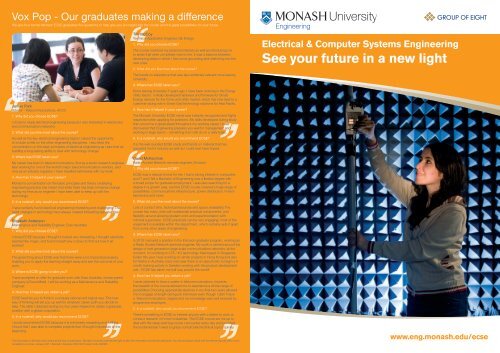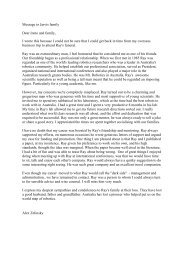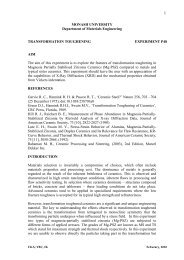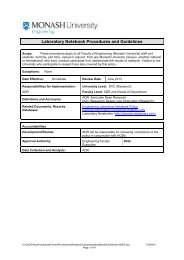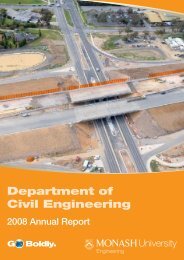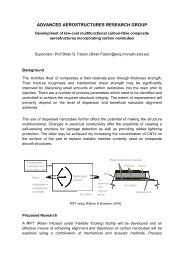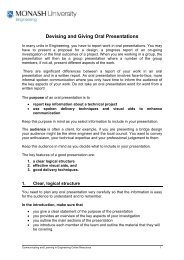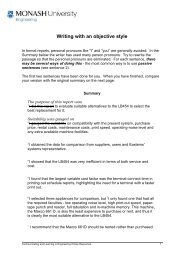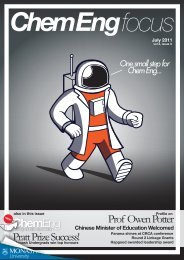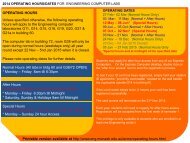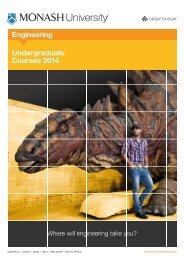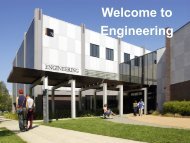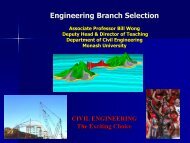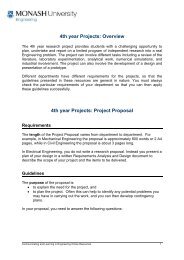Electrical and Computer Systems Engineering - Faculty of ...
Electrical and Computer Systems Engineering - Faculty of ...
Electrical and Computer Systems Engineering - Faculty of ...
Create successful ePaper yourself
Turn your PDF publications into a flip-book with our unique Google optimized e-Paper software.
Vox Pop - Our graduates making a difference<br />
We give four former Monash ECSE graduates five questions to help give you an insight into the course <strong>and</strong> the great possibilities for your future.<br />
James Park<br />
Advisor - Telecommunications, ACCC<br />
1. Why did you choose ECSE?<br />
I chose to study electrical engineering because I was interested in electronics<br />
<strong>and</strong> communication networks.<br />
2. What did you like most about the course?<br />
As well as the key electrical engineering topics I valued the opportunity<br />
to include a little on the other engineering disciplines. I also liked the<br />
concentration on the basic principles <strong>of</strong> electrical engineering as I saw that as<br />
building a long-lasting ability to deal with technology change.<br />
3. Where has ECSE taken you?<br />
My career has been in telecommunications, first as a senior research engineer,<br />
later working for one <strong>of</strong> the world’s major telecommunications vendors, <strong>and</strong><br />
now as an industry regulator. I have travelled extensively with my work.<br />
4. How has it helped in your career?<br />
Monash’s concentration on the basic principles <strong>and</strong> theory underlying<br />
engineering practice has meant that while there has been immense change<br />
during my time as an engineer I have been able to keep up with the<br />
technology.<br />
5. In a nutshell, why would you recommend ECSE?<br />
I have certainly found electrical engineering interesting <strong>and</strong> challenging. The<br />
rapid changes in technology have always created interesting opportunities.<br />
Elizabeth Anderson<br />
Maintenance <strong>and</strong> Reliability Engineer, Esso Australia<br />
1. Why did you choose ECSE?<br />
I chose ECSE because I thought it looked very interesting. I thought electricity<br />
seemed like magic, <strong>and</strong> found myself very curious to find out how it all<br />
worked!<br />
2. What did you like most about the course?<br />
The great thing about ECSE was that there were a lot <strong>of</strong> practical projects,<br />
enabling you to apply the learning straight away <strong>and</strong> see the outcome <strong>of</strong> your<br />
work.<br />
3. Where is ECSE going to take you?<br />
I have accepted an <strong>of</strong>fer for graduate work with Esso Australia, whose parent<br />
company is ExxonMobil. I will be working as a Maintenance <strong>and</strong> Reliability<br />
Engineer.<br />
4. How has it helped you obtain a job?<br />
ECSE teaches you to think in a uniquely rational <strong>and</strong> logical way. This new<br />
way <strong>of</strong> thinking will set you up well for whatever career path you decide to<br />
take. The skills I obtained during my four years helped me obtain a graduate<br />
position with a global corporation.<br />
5. In a nutshell, why would you recommend ECSE?<br />
I would recommend ECSE because it is immensely rewarding <strong>and</strong> fulfilling.<br />
I found that I was able to complete projects that I thought impossible at the<br />
beginning.<br />
Tim McCoy<br />
Technical Application Engineer, GE Energy<br />
1. Why did you choose ECSE?<br />
The course matched my personal interests as well as introducing me<br />
to areas that were completely new to me. It was a balance between<br />
developing areas in which I had some grounding <strong>and</strong> stretching me into<br />
new ones.<br />
2. What did you like most about the course?<br />
The h<strong>and</strong>s on experience that was also extremely relevant once leaving<br />
University.<br />
3. Where has ECSE taken you?<br />
Since leaving University 5 years ago, I have been working in the Energy<br />
Utility Sector. I initially developed hardware <strong>and</strong> firmware for Smart<br />
Energy devices for the home <strong>and</strong> utility market, which has now lead to a<br />
customer facing role in Smart Grid technology solutions for Asia Pacific.<br />
4. How has it helped in your career?<br />
The Monash University ECSE name was instantly recognized <strong>and</strong> highly<br />
respected when applying for positions. My skills developed during study<br />
then stood me in great stead throughout my working career. I have<br />
discovered that <strong>Engineering</strong> prepares you well for management <strong>and</strong><br />
working in large teams – something that I still do on a daily basis.<br />
5. In a nutshell, why would you recommend ECSE?<br />
It is the well rounded ECSE study <strong>and</strong> h<strong>and</strong>s on material that has<br />
prepared me for industry as well as I could ever have hoped.<br />
David McKechnie<br />
Radio Access Network services engineer, Ericsson<br />
1. Why did you choose ECSE?<br />
ECSE was a natural choice for me: I had a strong interest in computers<br />
<strong>and</strong> IT <strong>and</strong> I felt a Bachelor <strong>of</strong> <strong>Engineering</strong> was a flexible degree with<br />
a broad scope for graduate employment. I was also searching for a<br />
degree in a growth area, <strong>and</strong> the ECSE course covered a huge range <strong>of</strong><br />
possibilities: communications infrastructure, power distribution, hi-tech<br />
electronics <strong>and</strong> more.<br />
2. What did you like most about the course?<br />
Lots <strong>of</strong> contact time, technical resources <strong>and</strong> space availability! The<br />
course has many units with substantial practical components, <strong>and</strong><br />
flexibility around allowing student work <strong>and</strong> experimentation with<br />
minimal supervision. ECSE practicals can be very engaging: most <strong>of</strong> the<br />
equipment is available within the department, which certainly sets it apart<br />
from some other areas <strong>of</strong> engineering.<br />
3. Where has ECSE taken you?<br />
In 2010 I secured a position in the Ericsson graduate program, working as<br />
a Radio Access Network services engineer. My work is centred around the<br />
design <strong>of</strong> next generation large scale communications networks: at the<br />
moment, I’m working on LTE / 4G technology trials based in Singapore.<br />
Earlier this year I was working on similar projects in Hong Kong <strong>and</strong> also<br />
for Telstra in Australia. Early next year there is an opportunity to begin a 6<br />
month training activity in Sweden working with the product development<br />
unit - ECSE has taken me half way around the world!<br />
4. How has it helped you obtain a job?<br />
I never planned to have a career in telecommunications, however,<br />
the breadth <strong>of</strong> the course allowed me to experience a whole range <strong>of</strong><br />
possibilities Choosing appropriate electives in my final two years allowed<br />
me to engage at length during job interviews even though I didn’t have<br />
a ‘telecommunications’ degree <strong>and</strong> my knowledge was well received by<br />
prospective employers.<br />
5. In a nutshell, why would you recommend ECSE?<br />
There’s something in ECSE to interest anyone with a desire to work or<br />
conduct research in hi-tech industries. The ECSE course set me up to<br />
deal with the steep learning curves I encounter every day <strong>and</strong> provided<br />
the fundamentals I need to grasp complicated technical topics quickly.<br />
The information in this flyer was correct at the time <strong>of</strong> publication. Monash University reserves the right to alter this information should the need arise. You should always check with the relevant faculty <strong>of</strong>fice when<br />
considering a course. January 2011. Monash University CRICOS Provider Code 00008C<br />
<strong>Electrical</strong> & <strong>Computer</strong> <strong>Systems</strong> <strong>Engineering</strong><br />
See your future in a new light<br />
www.eng.monash.edu/ecse
Challenging.<br />
Exciting.<br />
Rewarding.<br />
The world <strong>of</strong> <strong>Electrical</strong> <strong>and</strong> <strong>Computer</strong> <strong>Systems</strong><br />
engineering is changing rapidly. There are<br />
new <strong>and</strong> emerging areas for employment <strong>and</strong><br />
research influencing a range <strong>of</strong> industries <strong>and</strong><br />
the way we live <strong>and</strong> operate day to day.<br />
Did you know?<br />
• According to figures in 2010, 30% <strong>of</strong> the production costs<br />
<strong>of</strong> the multi-billion dollar automotive industry are now<br />
electrical engineering costs. This figure is predicted to rise<br />
by 40% by 2015.<br />
• The IEEE, Institute <strong>of</strong> <strong>Electrical</strong> <strong>and</strong> Electronic Engineers,<br />
the electronic engineering association, is the largest<br />
pr<strong>of</strong>essional association for the advancement <strong>of</strong><br />
technology.<br />
• In Q3 2010, nearly half a billion mobile phones were sold<br />
worldwide, a rise <strong>of</strong> 35% on Q3 2009. Smartphone sales<br />
grew by 96% during this time!<br />
• The Chancellor <strong>of</strong> Monash University, Dr Alan Finkel is<br />
a graduate <strong>of</strong> the Department <strong>Electrical</strong> <strong>and</strong> <strong>Computer</strong><br />
<strong>Systems</strong> <strong>Engineering</strong> at Monash.<br />
Broaden your career options<br />
Your career options with a degree in <strong>Electrical</strong> <strong>and</strong> <strong>Computer</strong> <strong>Systems</strong> <strong>Engineering</strong> are limitless.<br />
Here are the study areas on <strong>of</strong>fer <strong>and</strong> their applications to career choices.<br />
Analog Electronics<br />
Diodes, transistors, op-amps, linear electronic circuits,<br />
feedback, complex impedances, sinusoidal analysis<br />
<strong>and</strong> phasors, frequency response <strong>and</strong> small signal<br />
analysis.<br />
Applications: Amplifiers, telecommunications <strong>and</strong><br />
sensor / actuator design for cars, aircraft <strong>and</strong> industrial<br />
automation.<br />
Digital Electronics<br />
Logic gates, flipflops, arithmetic logic units,<br />
programmable logic devices, hardware description<br />
language (HDL), RAM <strong>and</strong> ROM <strong>and</strong> VLSI.<br />
Applications: Telecommunications, computer design<br />
(from supercomputers to embedded systems in<br />
banking smartcards or myki).<br />
Final year project<br />
Telecommunications<br />
dVo<br />
dt<br />
s = a b<br />
c = a b<br />
= − Vi<br />
RC<br />
Transmitters, receivers, OFDM, modulation, digital<br />
communication, internet, LAN protocols, packet<br />
switching, TCP/IP, routing <strong>and</strong> congestion algorithms,<br />
noise <strong>and</strong> bit error rates, source <strong>and</strong> error coding,<br />
network security, MIMO <strong>and</strong> QoS.<br />
Applications: Wired, optical fibre <strong>and</strong> wireless networks,<br />
including the national broadb<strong>and</strong> network, smart meters,<br />
mobile phones <strong>and</strong> satellite communications.<br />
During level four, you can undertake an independent full-year project<br />
in an area <strong>of</strong> personal interest. Projects are <strong>of</strong>ten related closely to the<br />
department’s exceptionally strong research <strong>and</strong> collaborative industry <strong>and</strong><br />
programs within research centres.<br />
One key objective is to give you the experience <strong>of</strong> tackling a real problem<br />
<strong>and</strong> presenting via practical demonstrations <strong>and</strong> written reports.<br />
The final year project <strong>of</strong>ten leads to graduate opportunities in that area<br />
- employers are very impressed by this practical demonstration <strong>of</strong> a<br />
graduate’s abilities <strong>and</strong> interests.<br />
The final year project builds self-reliance <strong>and</strong><br />
planning capabilities in both individual<br />
<strong>and</strong> team-based environments.<br />
Mathematics<br />
Control <strong>Systems</strong><br />
Feedback loops, Laplace transforms, Nyquist <strong>and</strong> Bode<br />
diagrams, gain <strong>and</strong> phase margins, poles <strong>and</strong> zeros, state<br />
spaces, transfer functions, observability <strong>and</strong> controllability.<br />
Applications: Industrial automation for our water supply,<br />
chemical plants, factories, medical equipment <strong>and</strong> robotics.<br />
Geometry, vectors, matrices, Eigen values <strong>and</strong> vectors,<br />
calculus, Taylor series, complex variables, differential equations,<br />
statistics, finite element analysis <strong>and</strong> numerical methods.<br />
Applications: Everything!<br />
f (x) = (H (t) − H (t − 4π)) si n(t)<br />
Power Electronics<br />
Signal Processing<br />
G<br />
1 + GH<br />
Sampling, aliasing, digitising, Fourier series<br />
<strong>and</strong> spectra, filters, wavelets, adaptive <strong>and</strong><br />
real-time filtering.<br />
Applications: information transmission, data<br />
compression <strong>and</strong> processing sensor data.<br />
DC machines, induction motors, motor control,<br />
three-phase AC networks, transformers, transmission<br />
line modelling, power system control, generation <strong>and</strong><br />
supply, power converters <strong>and</strong> high voltage engineering.<br />
Applications: Underst<strong>and</strong>ing power generation <strong>and</strong><br />
distribution systems, generation from renewables,<br />
developing smart grid technologies <strong>and</strong> motor driven<br />
systems such as electric/hybrid vehicles.<br />
Biomedical <strong>Engineering</strong><br />
Third year design project<br />
Computing<br />
Instrumentation, optics, bio mechanics, muscles as motors <strong>and</strong> brakes,<br />
medical imaging, computational methods, medical technology innovation<br />
(from concept to market).<br />
Applications: Developing hospital equipment, prosthetics (from artificial<br />
limbs to bionic eyes), diagnostic tools <strong>and</strong> assistive technologies.<br />
Students use knowledge from electronics, computer engineering<br />
<strong>and</strong> communications engineering, to tackle a group project to<br />
design a robot.<br />
This allows them to apply project management skills, <strong>and</strong> extend<br />
their experience <strong>of</strong> working in groups.<br />
At the end <strong>of</strong> the semester, all robots are pitted against each other<br />
in a nerve wracking competition to find out which team’s design <strong>and</strong><br />
implementation is the best.<br />
Programming in Matlab <strong>and</strong> C, data types, program<br />
statements, functions, parameters, data types, numerical<br />
methods such as Gaussian elimination, solution <strong>of</strong> nonlinear<br />
equations <strong>and</strong> numerical calculus, object-oriented<br />
programming, interfacing with hardware, CPUs, data paths,<br />
concurrency <strong>and</strong> memory structures<br />
Applications: <strong>Computer</strong> design, video games, user interface<br />
design <strong>and</strong> digital control systems such as automotive<br />
management systems.<br />
<strong>Computer</strong> Vision<br />
<br />
2D image processing, detection <strong>of</strong> edges <strong>and</strong> corners in<br />
images, matching between views, inferring 3D structure from<br />
2D images, visual tracking.<br />
Applications: Robotics, medical Imaging <strong>and</strong> intelligent<br />
user interfaces such as mobile phone augmented reality<br />
applications.<br />
For more information visit www.eng.monash.edu.au/ecse<br />
Or contact Ros Rimington at ros.rimington@monash.edu<br />


